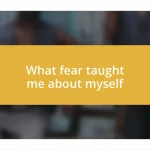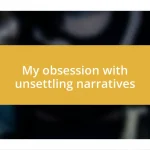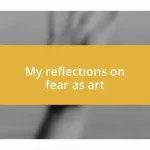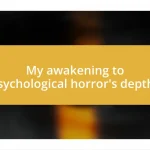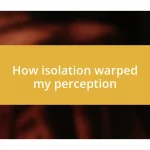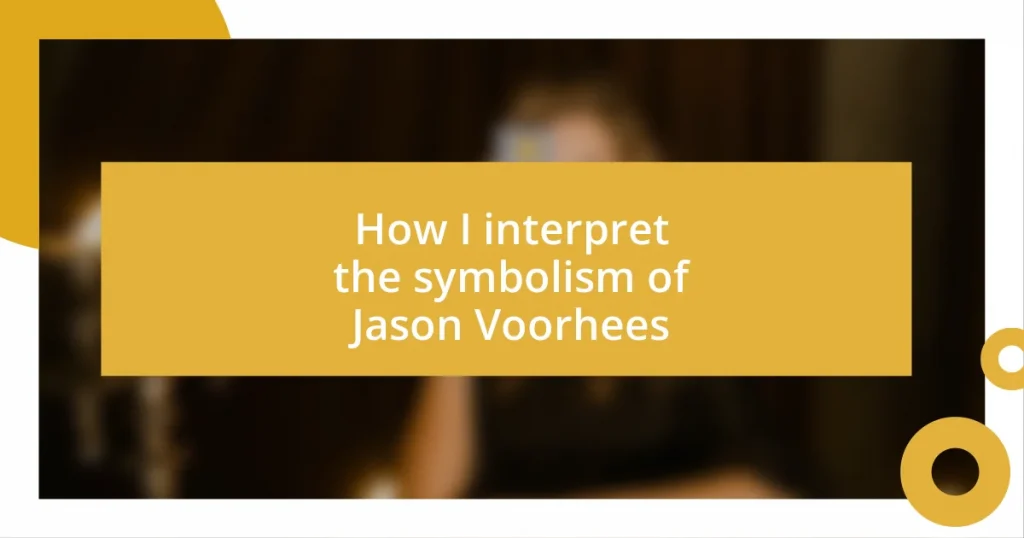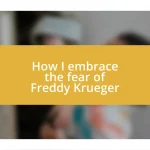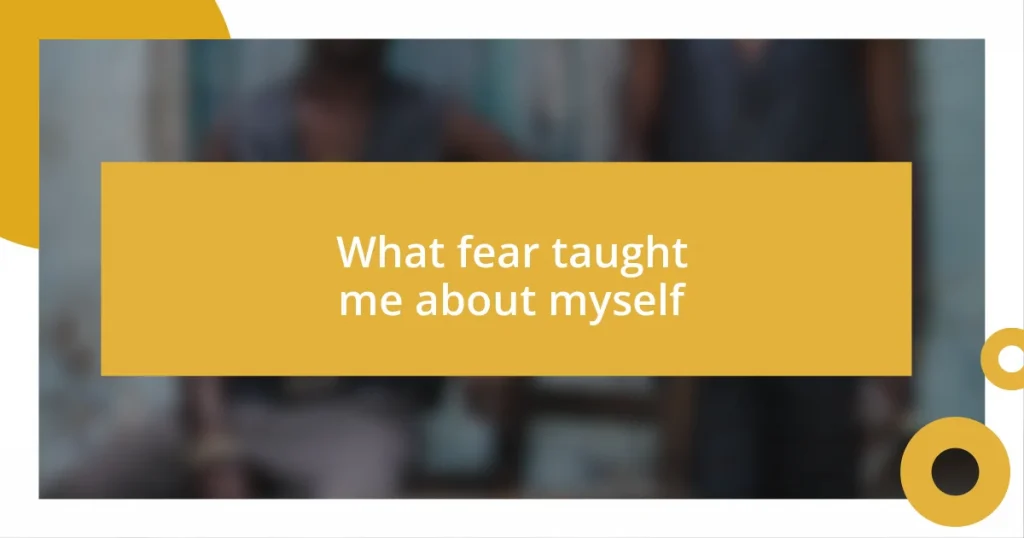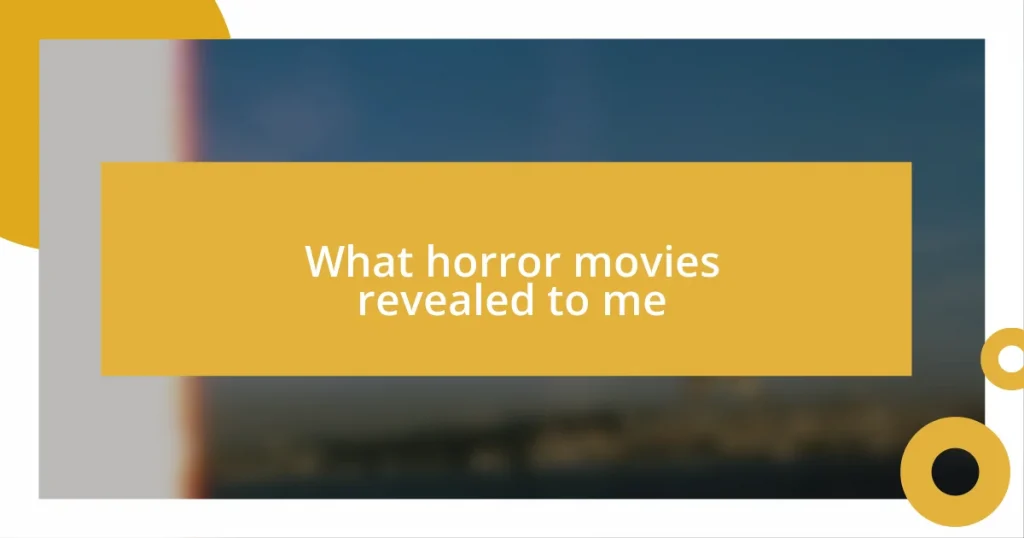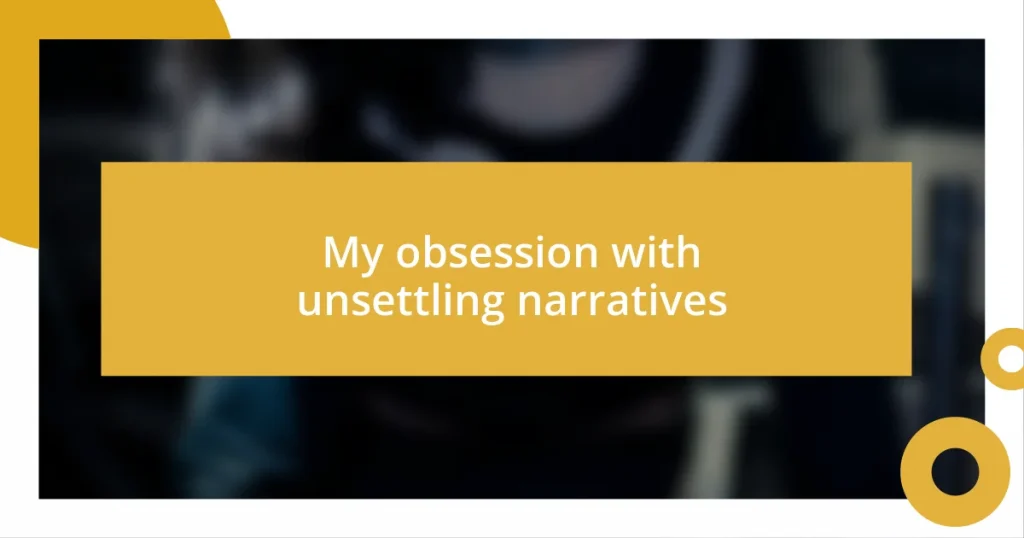Key takeaways:
- Jason Voorhees symbolizes the struggle between innocence and trauma, reflecting societal darkness and the consequences of unresolved grief.
- His character embodies collective trauma and the impact of parental neglect, serving as a narrative vehicle to explore human suffering and isolation.
- Jason’s actions highlight the dangers of unresolved emotions and the importance of connection, emphasizing that solitude can lead to destructive behaviors.
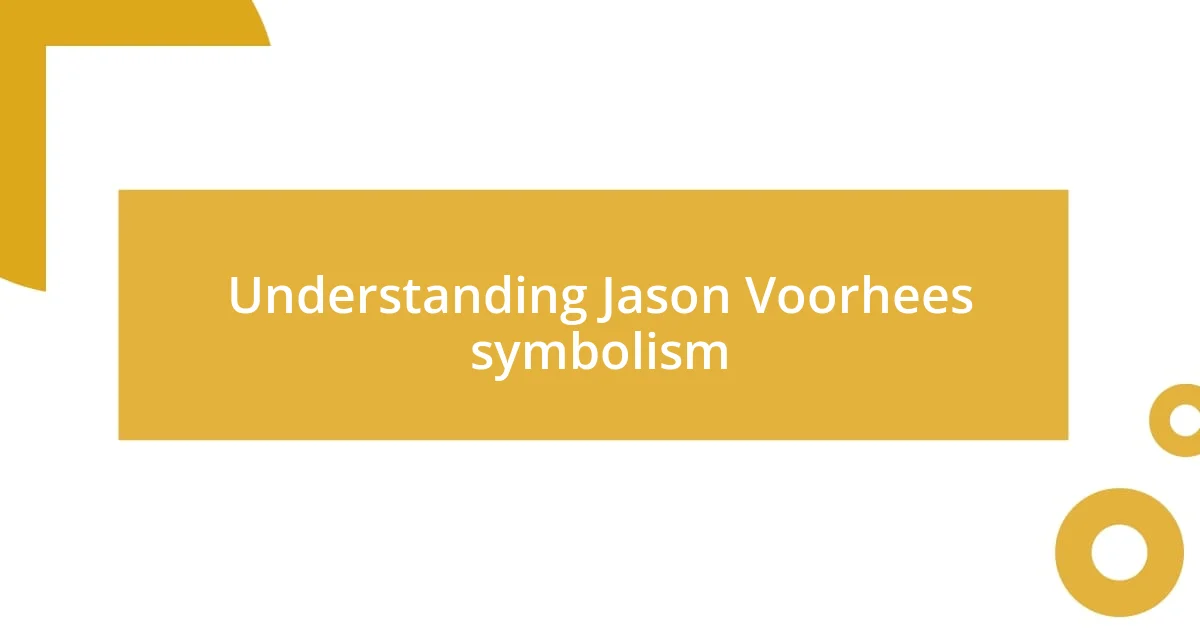
Understanding Jason Voorhees symbolism
Jason Voorhees embodies the eternal struggle between innocence and vengeance. In a way, I see him as a reflection of society’s darker instincts—how we respond to trauma and pain. It begs the question: what are the consequences of unresolved grief? I remember feeling a chill when I first realized that beneath his monstrous exterior lies a deeply tragic backstory.
His hockey mask, in my view, symbolizes both anonymity and alienation. Wearing it allows Jason to detach from his humanity, creating a chilling paradox—murder as a manifestation of his pain. I often wonder if we all hide behind metaphorical masks at times. Those moments of isolation can feel just as suffocating as those Jason experiences, compelling us to confront our feelings in different ways.
Furthermore, the setting of Crystal Lake is significant; it serves as a battleground for his unresolved feelings. I have found myself fascinated by how a once-peaceful place becomes the stage for horror, showcasing how trauma can transform spaces. Looking at it this way, isn’t it interesting how environments can mirror our inner turmoil? The very places that should provide safety can become sites of dread when haunted by such sorrow.
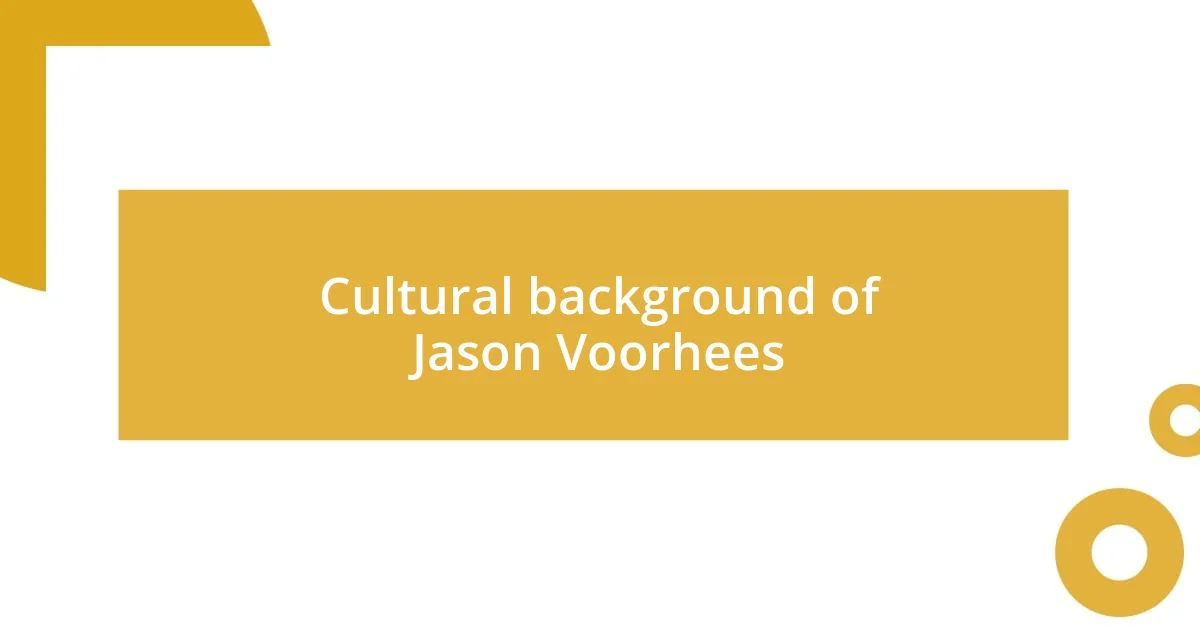
Cultural background of Jason Voorhees
Jason Voorhees originated in the 1980s amidst a cultural backdrop rich in horror and exploration of societal fears. I recall how during that era, slasher films became a lens through which audiences examined darker aspects of humanity, often tied to real-world anxieties. His character became a symbol of not just fear but also the consequences of neglect, reflecting a collective anxiety about the impact of parental abandonment.
As I delve deeper into Jason’s world, I can’t help but think about the collective trauma intertwined with his rise as an icon. The 1980s marked a significant shift in American values, as the innocence of previous decades waned. Viewing his story, I find Jason represents our struggle to process grief and loss. Isn’t it poignant how fictional narratives often contextualize the human experience of suffering and vengeance?
The evolution of Jason’s character throughout the decades mirrors societal changes, often embodying the fears of the time. I remember discussing with friends how horror films explore taboo subjects, acting as modern-day cautionary tales. Jason is not merely a character; he highlights the darker decisions we make when faced with despair and isolation. It’s fascinating to consider how a seemingly supernatural entity can echo our very real emotional battles.
| Cultural Context | Description |
|---|---|
| 1980s Horror Surge | Reflects societal fears and parental neglect through slasher genre |
| Collective Trauma | Embodies the impact of loss and grief in a transforming society |
| Character Evolution | Mirrors fears of the time; highlights human emotional struggles |
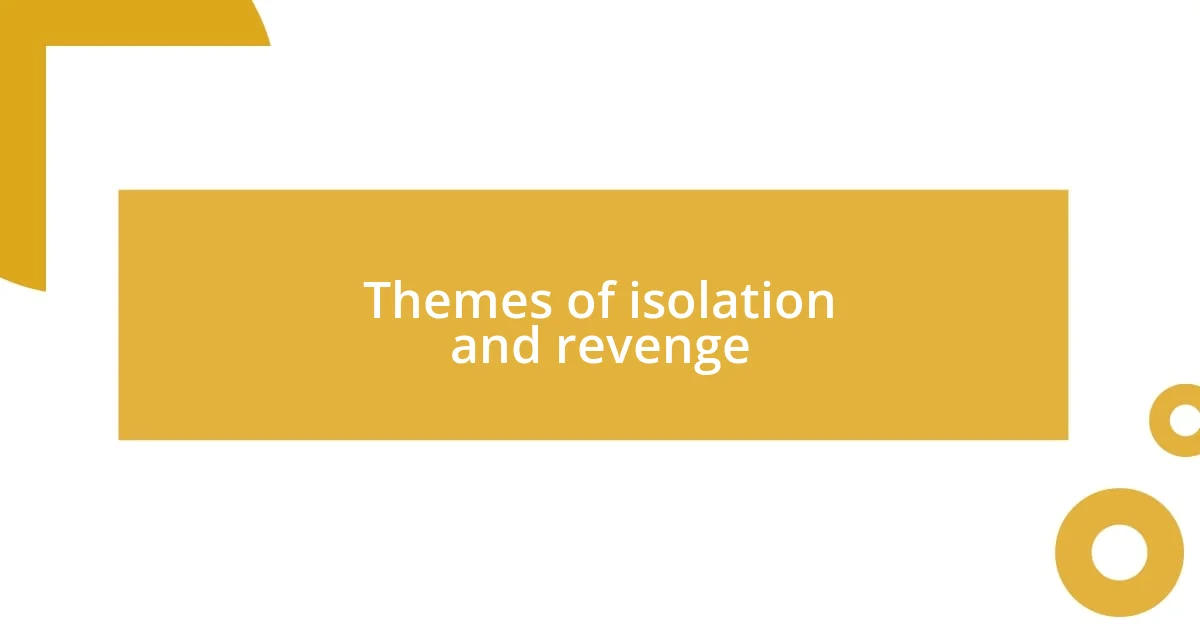
Themes of isolation and revenge
The themes of isolation and revenge in Jason Voorhees’ story resonate deeply with the human experience. I can’t shake the feeling that Jason’s relentless pursuit of vengeance stems directly from his profound loneliness. Each act of violence feels like a cry for connection, even if distorted. It reminds me of times when I grappled with feelings of being an outsider—how they can warp one’s perspective and drive destructive behaviors. When I reflect on Jason, I see a figure marred by an absence of love and understanding, transforming solitude into a weapon.
- Isolation creates a chasm that drowns the possibility of healing.
- Revenge becomes the only form of solace, albeit a hollow one.
- The toxic cycle underscores the necessity of human connection to mitigate pain.
When Jason emerges from the shadows, he carries the weight of betrayal and neglect. His actions mirror a yearning for acknowledgment, reflecting our own desires for validation. I find this aspect particularly unsettling because it forces me to confront the darkness we often overlook in ourselves. At times, I’ve felt driven by anger; it can be tempting to lash out when one feels rejected or unheard. By embodying vengeance, Jason becomes a haunting reminder that unresolved isolation can foster deep-seated rage. This connection between his solitude and his thirst for retribution is a poignant narrative thread that I can’t ignore.
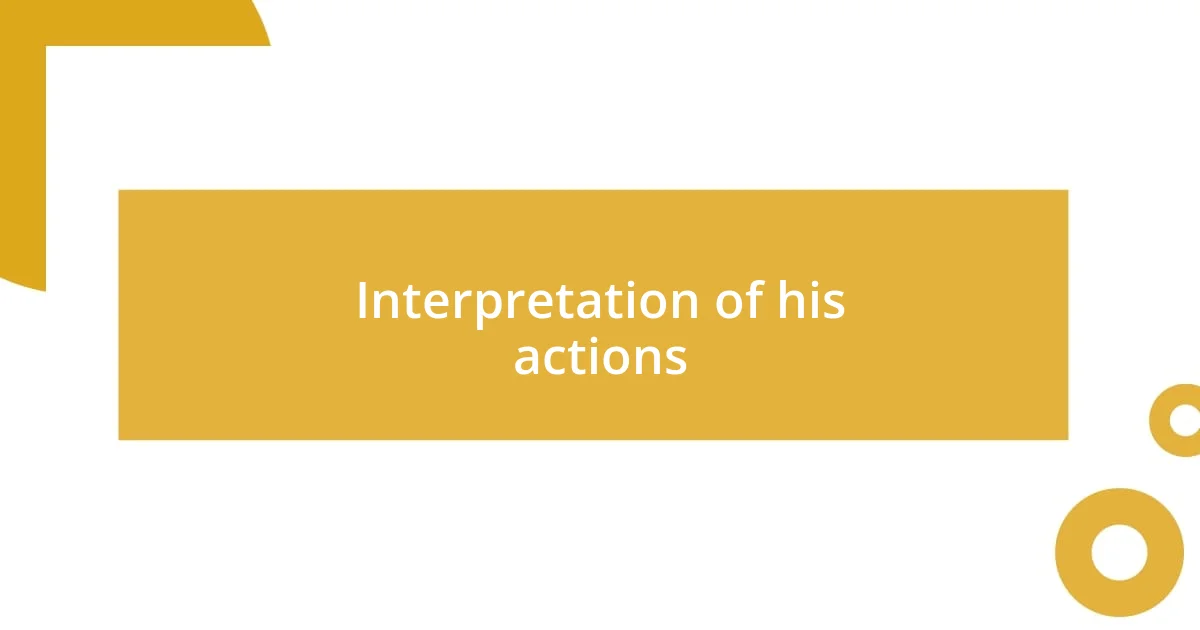
Interpretation of his actions
When I analyze Jason’s actions, I can’t help but see them as a manifestation of unresolved pain. His relentless pursuit of his victims feels like a desperate grasp at power, much like when I’ve felt the need to assert myself in moments of vulnerability. Isn’t it fascinating how our darkest impulses often root from deep wounds? Each slash and strike seems to scream for attention, revealing how deeply scarred he truly is.
There’s an unmistakable ritualistic quality to his violence. I often think about how, in moments of chaos in my own life, I’ve clung to certain routines or actions to regain control. Jason, through his methodical attacks, mirrors that instinct; his actions are a twisted echo of surviving trauma. It’s like a morbid dance of destruction where each move is predictable yet frightening. Have you ever felt compelled to act in ways that felt almost instinctual, even when you knew they weren’t healthy?
As I unpack the symbolism behind Jason’s relentless actions, it’s clear they reflect the consequences of lifelong neglect. I remember times when feelings of being overlooked led me down paths I regret. In a way, Jason embodies that raw, unfiltered rage that surfaces when we perceive ourselves as invisible. His iconic mask serves as both a shield and a trap, turning his pain into a weapon. It makes me wonder, how often do we let our unresolved emotions dictate our actions, leading to a cycle of hurt rather than healing?
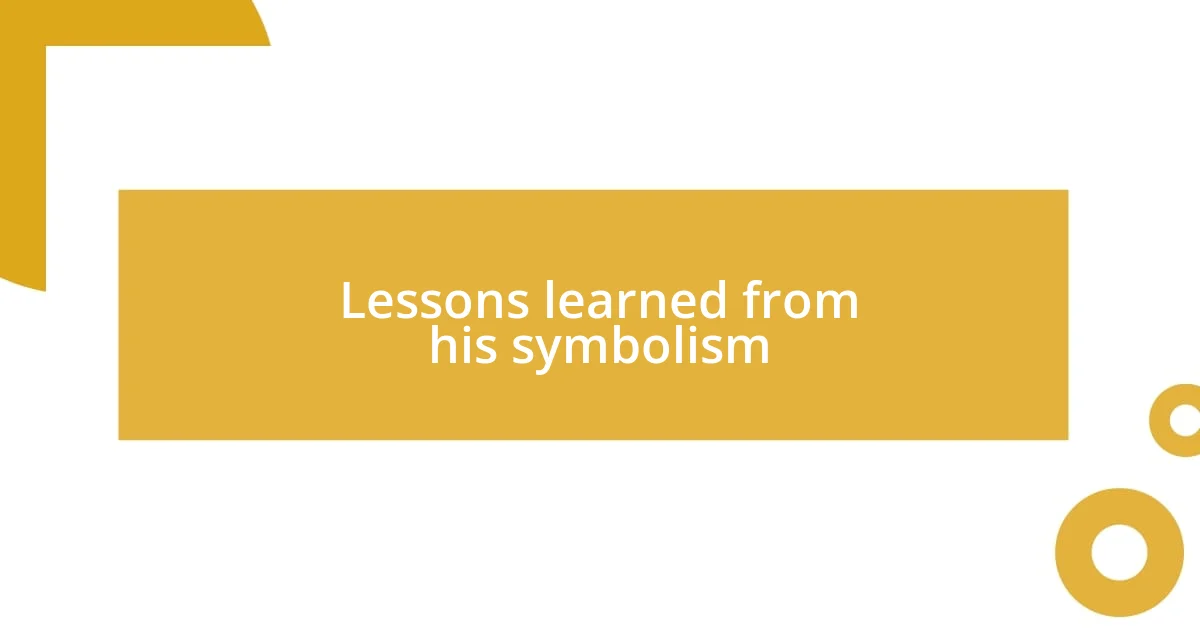
Lessons learned from his symbolism
When I reflect on Jason Voorhees’ symbolism, I can’t help but think about the profound lessons surrounding our need for connection. His endless cycle of vengeance serves as a stark reminder of how isolation can distort our intentions. Personally, I’ve witnessed how withdrawing from others can amplify feelings of anger and resentment, creating an internal storm that’s tough to navigate. Have you ever felt that sneaking urge to push people away when you’re hurting, only to realize it only deepens your pain?
Jason’s symbolism also brings to light the dangers of allowing unresolved issues to fester unchecked. It’s a lesson I’ve learned the hard way; ignoring my own feelings often led to explosive reactions later. Watching Jason unleash his fury, I recognize my past moments of lashing out when I felt unheard. Each time he strikes, it’s like a warning: if we don’t address our emotions, they can morph into something darker. I find that notion unsettling but necessary to confront—how many of us let old wounds dictate our current actions?
Moreover, the mask that Jason dons encapsulates the idea of hiding one’s true self. I’ve experienced times when I wore metaphorical masks to shield my vulnerability, thinking it would protect me. But isn’t it ironic? In trying to shield ourselves, we can end up hurting others, much like Jason does. It makes me ponder, what would happen if we unveiled our pain instead of masking it? The lessons of Jason remind us that confronting and sharing our struggles could lead not only to personal healing but to deeper connections with others.
